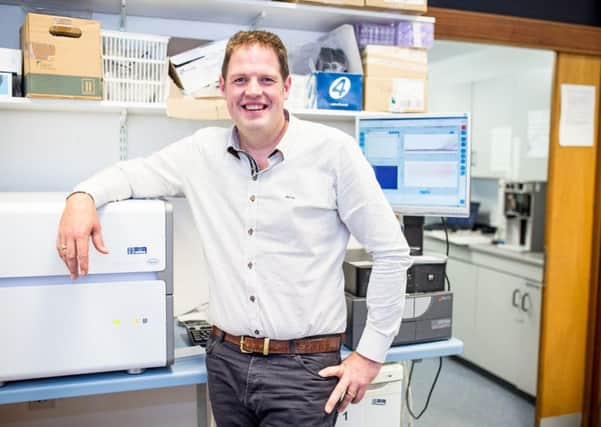Cookstown doctor’s cancer research bringing ‘golden’ results


Dr Jonathan Coulter is a Lecturer in Experimental Therapeutics with the School of Pharmacy at Queen’s University and is experimenting with tiny gold particles (known as nanoparticles) with the aim of increasing the sensitivity of tumour cells to radiotherapy.
“The nanoparticles can be as small as one-millionth of a millimetre,” Dr Coulter told the Mail.
Advertisement
Hide AdAdvertisement
Hide Ad“At the moment, we have established a reproducible technique for making gold nanoparticles that are about the width of 15 millionths of a millimetre.
“Now that we can do this, we’ll attach two different compounds to the surface of these particles. One is a commonly used polymer called PEG, which helps with stability, and the other is a small protein called pepducin. The pepducin will attach to two proteins that are expressed on the outside of advanced prostate cancer cells. We have also shown that radiotherapy can increase the number of these surface proteins, which we hope will give us a straightforward way to increase the number of targets for our gold nanoparticles.
“As part of this process, we’ll also work out exactly how many nanoparticles we need to make various prostate cancer cell lines sensitive to radiation. Finally, we will use a technique called small animal computed tomography (CT) to study mice that have developed human prostate cancers, and measure the accumulation of the nanoparticles to help inform us exactly when we should administer radiation treatment.”
Dr Coulter said that he plans to spend 36 months on the project.
Advertisement
Hide AdAdvertisement
Hide Ad“External beam radiotherapy (RT) is the most common treatment for prostate cancer at the moment, but the cancer will eventually return in 30% of men who have this treatment.
“That means we need to find new ways to make this treatment more effective.
“ A number of physical and chemical interactions make heavy metals like gold effective radiation sensitisers.
“To date, our research group has generated convincing data that gold nanoparticles combined with radiation therapy strongly increase tumour cell killing compared to radiation alone.
Advertisement
Hide AdAdvertisement
Hide Ad“In addition to all this, our approach is radically different in its simplicity compared to other experimental nano-drugs, in that targeting the surface of the cell will bypass many of the internal cellular barriers that often limit a drug’s full potential.”
“Over the past seven years we’ve demonstrated the potential of gold particles to increase the effectiveness of radiation and gained a detailed understanding of how this happens. Gold particles by themselves have little effect on cell survival, but when combined with radiotherapy they promote cell death.
“We will design gold particles to target receptors in the cell membrane, which we know induces tumour cell death. We also know that the protein we will use to target the nanoparticles are highly expressed on advanced prostate cancer cells. Importantly, low doses of radiation can significantly increase the levels of this protein, so may well improve the specific delivery of gold particles to the prostate tumour.
“We expect to demonstrate that targeting the cell membrane is a valid approach for increasing the radiosensitivity of prostate tumours. We will develop a stabilised gold nanoparticle and also investigate the ability of these particles to penetrate a solid tumour cell mass. Using our recently acquired small animal CT scanner (CCRCB, QUB), we expect to be able to image nanoparticle accumulation within the tumour in whole animal models. If this approach proves beneficial, it could eventually radically alter the way that radiotherapy is applied in the clinic.
Advertisement
Hide AdAdvertisement
Hide Ad“Patient benefit is only likely to be seen in the long-term. Radiotherapy remains the primary treatment method for men with localised and advanced prostate cancer, and if used appropriately, it offers a good chance of cure. However, the side-effects from damage to organs like the colon and bladder, caused by radiation, results in a significant impairment to quality of life.
“Using non-toxic, effective radiosensitisers like our gold particles could allow radiation physics teams to design treatment plans that provide better tumour control while limiting damage to vital organs.”
If you’d like to know more about Jonny’s project, or any other research happening at the School of Pharmacy, make sure to check out their website at www.qub.ac.uk/pha.